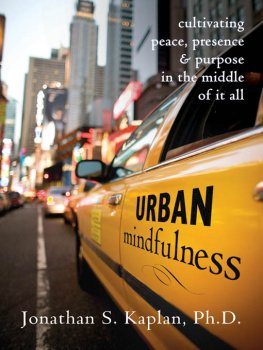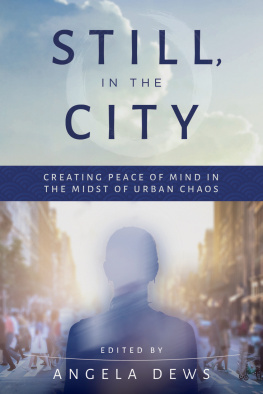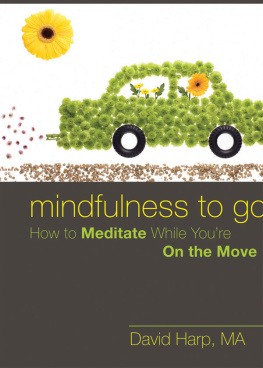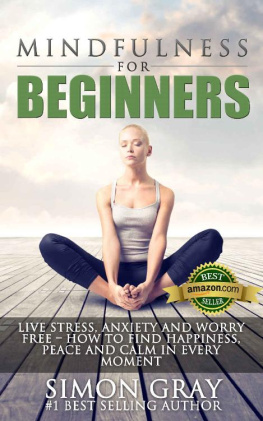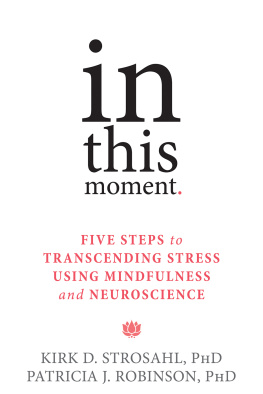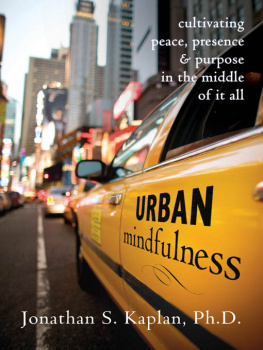What if your city were converted into a Zen practice center overnight? How would you manage take-out food, apartment envy, online dating, and waiting for the bus? This delightful book can make your city shine, and if you dont live in the city, youll wish you did. Its about mindfulness as its truly liveddeep, curious, and full of fun.Christopher K. Germer, Ph.D., clinical instructor at Harvard Medical School and author of The Mindful Path to Self-Compassion Jonathan Kaplans Urban Mindfulness is an engaging, useful, and enlightening guide to living in a world that often seems filled with pressure, chaos, and tension. This is a book that you can use every day to help you find peace and purpose in the smallest but most important moments of your life. There is peace out there, and it comes from within.Robert L. Leahy, Ph.D., director of the American Institute for Cognitive Therapy and clinical professor of psychology at Weill Cornell Medical CollegeAlthough city living can be stressful, it also provides us with many opportunities for reflection and insight. This book reminds us that we can discover tranquility within ourselves and connection in the city itself. It is an excellent guide with many helpful suggestions on how to do just that.Sharon Salzberg, author of Lovingkindness In Urban Mindfulness , Kaplan provides a host of ways to practice being aware, without judgment, in the present moment, in the midst of busy, complex, city-based lives. This book can serve as a useful, practical resource for anyone interested in cultivating mindfulness within the context of their lives, as opposed to during a remote retreat. The wide range of exercises, such as the subway meditation and mindful texting exercise, ensures that readers will find several practices that speak to them.Lizabeth Roemer, Ph.D., professor of psychology at the University of Massachusetts Boston and coauthor of The Mindful Way Through Anxiety Many thanks to Kaplan for offering so many practical and rewarding ways to be more mindful in urban environments. In this easy-to-use book, he reminds us that being mindful is simply about being aware and present and it is not dependent on, or limited by, where we are or what we are doing.Jeffrey Brantley, MD, author of Five Good Minutes and Calming Your Anxious Mind
Publishers Note
This publication is designed to provide accurate and authoritative information in regard to the subject matter covered. It is sold with the understanding that the publisher is not engaged in rendering psychological, financial, legal, or other professional services. If expert assistance or counseling is needed, the services of a competent professional should be sought.
Distributed in Canada by Raincoast Books
Copyright 2010 by Jonathan Kaplan
New Harbinger Publications, Inc.
5674 Shattuck Avenue Oakland, CA 94609
www.newharbinger.com
Cover design by Sara Christian; Text design by Michele Waters-Kermes;
Acquired by Melissa Kirk; Edited by Nelda Street
The Library of Congress has cataloged the print edition as:
Kaplan, Jonathan S.
Urban mindfulness : cultivating peace, presence, and purpose in the middle of it all / Jonathan S. Kaplan.
p. cm.
Includes bibliographical references.
ISBN 978-1-57224-749-9
1. Stress (Psychology) 2. Stress management. 3. Meditation. 4. City and town life. I. Title.
BF575.S75K367 2010
158.12--dc22
2010020703
All Rights Reserved.

With love to Eli and Baby Reed, who inspire my practice and let me knowquite vocallywhenever my attention has wandered from the present moment.
Acknowledgments
I would like to express my deep gratitude to the many people who encouraged, supported, and guided me as I wrote this book. From the outset, my editors at New Harbinger, Melissa Kirk and Jess Beebe, impressed me with their constructive suggestions and helpful feedback. Their collective expertise in content and style have made this a better book than it would have been otherwise.
The writings and practices of many profound teachers, including the following, have influenced my own personal journey in contemplative practice: Henry David Thoreau, D. T. Suzuki, Morihei Ueshiba, Sharon Salzberg, Thich Nhat Hanh, H. H. the Dalai Lama, and Pema Chdrn. In addition, the courage and dedication of the pioneers who introduced Buddhist practices and Asian healing approaches to American psychology continue to impress me, including Herbert Benson, Jon Kabat-Zinn, Jack Kornfield, Ellen Langer, Marsha Linehan, Alan Marlatt, and David Reynolds, among others. I also appreciate the wonderful example my friend and mentor, Bob Leahy, sets by doggedly pursuing what matters, even when confronted by setbacks.
I am indebted to my clients, who have given me the privilege of helping them through very difficult times. Seeing their perseverance and hard work in therapy inspires me to do my best and be the best psychologist I can be. It has been an honor to serve them.
I am also fortunate to have enjoyed the support of so many friends and colleagues that its impossible to mention them all here. I would be remiss, however, if I didnt thank the following people: Joe DeCola, for sharing the joys and travails of being a dad; Sunna Jung, for sharing an appreciation of whats for lunch; Fred Weiner, for sharing life in the country; Lee Coleman, for sharing a passion for zombies; Mark Becker and Andrs Montoya, for sharing a beer; and whichever Facebook friend turned me on to the cat (as in feline) that plays keyboards.
I would also like to express my gratitude to Lybi Ma and the other editors at the Psychology Today website for their support of the Urban Mindfulness blog.
I want to especially thank Jennifer Egert, Rob Handelman, and Irene Javors, who have tirelessly and patiently contributed to urbanmindfulness.org. Together, with the insightful comments of our dedicated blog readers, we have shown the importance of bringing mindfulness to city living and have created our own online community.
My parents, sister, and in-laws were wonderfully supportive of me during the writing process. Whether by coming all the way to New York to lend a hand or by sending care packages (including the comics), they were there for me every step of the way. I feel tremendously grateful for their love. And, though it pains me to say this, the periodic reminders to Get a haircut! were helpful too.
Words cannot express my gratitude and love for my wife, Doris. She has provided unconditional support, tireless editing, and selfless accommodations for my work. Her love has sustained me in times of doubt, and the freshly baked bread hasnt hurt either.
Finally, I want thank my fellow New Yorkers. Though its hard to appreciate when were jammed into a crowded subway car, we share the same path in seeking happiness and well-being. By acknowledging our inherent similarities and honoring our differences, we can unite in cultivating a more mindful, compassionate society.
Contents
Chairman Meow Is So Soft
Introduction
Several years ago, I moved to New York City from rural Ohio. Before living in Ohio, I lived in big cities all over the world, including Boston, Tokyo, San Francisco, and Los Angeles. But my time in Ohio was my first experience of small-town life. Working as a professor and psychologist in a college town, I enjoyed both my five-minute commute to work and all the free time I could devote to family, friends, exercise, gardening, meditation, and mindfulness practice. My life was remarkably stress free anddare I say?balanced. However, I missed the excitement, culture, and variety of the city. When I wanted to savor some fresh sushi or see the latest traveling art exhibit, there was no place to go. Lured by these opportunities and a new job, I left country life and headed back to the city.
Next page
